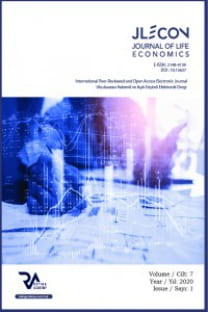KÜRESEL FİNANS VE “YÜKSEK ETKİLEŞİMLİ ŞİRKETLER"
Dünya Ekonomisinde 1980’lerden beri uygulamaya konan Neoliberal Finansallaşma süreci; finans kesiminde farklı eşitsizlik boyutlarıyla sürmektedir. Finansallaşmanın şimdiye kadar ortaya çıkan verilerine göre, krizlere ortam hazırlamakta olduğu kanısı güçlenmektedir. Bu çalışmada, “yüksek etkileşimli şirketler” aracılığıyla finansallaşmanın getirdiği eşitsizlik boyutunun hızlandırıldığı ve uluslararası borçluluğun artışıyla bu sürecin yeni finansal kriz çıkarma olasılığının yükseldiği öne sürülecektir. Yüksek etkileşimli şirketlerin büyük çoğunluğu finans şirketi olmasından hareketle, Küresel finans kesiminin arasındaki ilişkilerde etkilenme ve birbirini belirleme olasılığı giderek artmaktadır. Dünya borçluluk oranındaki artış, bize finans kesiminin dünyada net sermaye akımı düşmesiyle birlikte olumsuz sinyaller vermektedir.
Anahtar Kelimeler:
Finansallaşma, Borçlar, Kriz, Yüksek Etkileşimli Şirketler, Neoliberalizm
GLOBAL FINANCE AND “STRONGLY CONNECTED COMPENENT”
The Neoliberal Financialization process, which has been practiced in the World Economy since the 1980s, continues with different inequalities in the financial sector. According to the data of the financialization that has emerged up to now, the opinion that the crisis is preparing the environment is getting stronger. In this study, it will be argued that the dimension of inequality brought about by the "strongly connected compenent" has been accelerated and the possibility of the new financial crisis of this process has increased with the increase of international debt. As the majority of strongly connected compenent are financial companies, there is a growing likelihood that they will be affected and identified by the relationships among the global financial sector. The increase in the world debt rate gives us negative signals as the financial sector cuts the net capital flow in the world.
Keywords:
Financialization, Debts, Crisis, Strongly Connected Compenent, Neoliberalism,
___
- MIKLER J., SUNDRAN R.,AINSLEY E., “THE Shifting Face of Financial Power post the Global Financial Crisis in Liberal Market Economics”p.5, Online Paper Room, ipsa.org. http://paperroom.ipsa.org/papers/paper_29839.pdf , erişim tarihi 20 Eylül 2016 ROWLEY Anhtony, Global Capital, “Record World debt much worse than IMF numbers - 163 tr Dollar says” IIF, 6 October, 2016. ŞİŞMAN Deniz, (2015),”Ulusötesi Şirketler ve Küresel Kriz”,Marmara Üniversitesi İktisadi ve İdari Bilimler Dergisi,Cilt XXXVI, Sayı II ŞİŞMAN Deniz, (2012), “Küresel Kuruluşlar, Düzenlemeler ve Gelişmekte olan Ülkelerin Konumu”, Yayınlanmamış Doktora tezi ŞİŞMAN Mehmet ve ŞİŞMAN Deniz “Para-Banka ve Finans”, içinde Küresel Kriz ve Türkiye’de Para ve Finans Piyasaları, Orion, 2016, Istanbul. VİTALIS S., GLATTER J., BATTISTON S., (2011) , “The Capitalist Network that runs the World”, New Scientist , October 20-23 IMF, World Economic Outlook, April 2016. http://www.bloomberght.com/haberler/haber/1910318-italyan-bankalarinin-sorunlu-kredihacmi-360-milyar-euroya-ulasti http://www.greendump.net/tag/orbis-2007-database, erişim tarihi Kasım 2010 UNCTAD, The world's top 100 non-financial TNC's, ranked by foreign assets 2012, www.unctad.org/fdistatistics -UNCTAD The world's top 100 non-financial TNC's, ranked by foreign assets 2013, www.unctad.org/fdistatistics.
- Yayın Aralığı: Yılda 4 Sayı
- Başlangıç: 2014
- Yayıncı: Rating Academy
